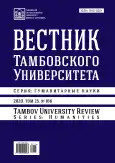Stages of teaching students a second foreign language based on cognitive communicative approach
- Authors: Borozdina N.A.1
-
Affiliations:
- Kursk State University
- Issue: Vol 25, No 186 (2020)
- Pages: 42-47
- Section: THEORY AND METHODS OF FOREIGN LANGUAGE TEACHING
- URL: https://bakhtiniada.ru/1810-0201/article/view/298625
- DOI: https://doi.org/10.20310/1810-0201-2020-25-186-42-47
- ID: 298625
Cite item
Full Text
Abstract
Educators should carefully plan their teaching activities especially when it comes to second foreign language teaching. One of the most common problems many students face when learning a second foreign language is a negative language transfer which arises due to the influence of the native language and the first foreign language. Especially difficult is the overcoming of negative language transfer in the process of studying the prepositions of a second foreign language. In order to help students overcome the emerging negative language transfer under the influence of several languages educators should create a special learning environment that would contribute to creating special learning connections in learners’ minds. We consider the benefits of cognitive communicative approach in relation to the process of overcoming negative language transfer when studying the prepositions of a second foreign language. We propose and describe an algorithm for overcoming negative language transfer which includes the following stages: 1) planning stage; 2) selection of the most suitable methodological content; 3) creation of scaffolded methodic content; 4) scaffolded practice of skills; 5) independent students’ practice; 6) assessment stage.
About the authors
N. A. Borozdina
Kursk State University
Author for correspondence.
Email: nataliia.borozdina@yandex.ru
ORCID iD: 0000-0002-9327-9084
Post-Graduate Student, Theory and Methods of Foreign Languages Teaching Department
33 Radishcheva St., Kursk 305000, Russian FederationReferences
- Vygotskiy L.S. Psikhologiya razvitiya. Izbrannyye raboty [Developmental Psychology. Selected Works]. Moscow, “Urait” Publ., 2019, 281 p. (In Russian).
- Ignatova M.N., Tarasyuk N.A. Usloviya preodoleniya grammaticheskoy interferentsii v protsesse izucheniya nemetskogo yazyka kak vtorogo inostrannogo na baze angliyskogo yazyka kak pervogo inostrannogo [Conditions of grammar interference avoidance in the process of learning several languages]. Nauka i mir – Science and World, 2014, vol. 2, no. 12 (16), pp. 107-110. (In Russian).
- Korzh T.N. Printsipy inoyazychnogo professional’no-oriyentirovannogo obucheniya s pozitsiy kognitivnokommunikativnogo podkhoda [Principles of language for special purposes (LSP) teaching within the framework of cognitive and communicative approach]. Voprosy metodiki prepodavaniya v vuze – Teaching Methodology in Higher Education, 2017, vol. 6, no. 20, pp. 37-45. (In Russian).
- Mayboroda S.V. Kommunikativno-kognitivnyy podkhod v obuchenii svyaznoy rechi inostrannykh studentov-medikov [Communicative cognitive approach in teaching coherent speech of foreign medical students]. Pedagogika vysshey shkoly [Pedagogy of Higher School], 2016, no. 1, pp. 66-68. (In Russian).
- Matiyenko A.V. Predmet yazykovogo testirovaniya s pozitsiy kognitivno-kommunikativnogo podkhoda [The subject of language testing from the standpoint of the cognitive communicative approach]. Vestnik Pyatigorskogo gosudarstvennogo lingvisticheskogo universiteta – Pyatigorsk State Linguistic University Bulletin, 2011, no. 2, pp. 278-281. (In Russian).
- Matiyenko A.V. Formirovaniye yazykovoy lichnosti v protsesse obucheniya kontrol’no-izmeritel’noy deyatel’nosti [Formation of the lingual identity in the assessment activities’ learning process]. Teoreticheskaya i prikladnaya lingvistika – Theoretical and Applied Linguistics, 2016, vol. 2, no. 2, pp. 93102. (In Russian).
- Sorokoumova V.N. Formirovaniye professional’nykh znaniy v aspekte kognitivno-kommunikativnogo podkhoda k obucheniyu studentov-filologov [Formation of professional knowledge through cognitivecommunicative approach in philological education]. Integratsiya obrazovaniya – Integration of Education, 2004, no. 4, pp. 106-111. (In Russian).
- Tsybulko L., Bespechnaya S. Kognitivno-kommunikativnyy podkhod v metodike prepodavaniya inostrannykh yazykov na sovremennom etape [Cognitive communicative approach in the methodology of teaching foreign languages at the present stage]. Aktual’nyye nauchnyye issledovaniya v sovremennom mire [Current Scientific Research in the Modern World], 2018, no. 11-7 (43), pp. 189-193. (In Russian).
- Shchepilova A.V. Teoriya i metodika obucheniya frantsuzskomu yazyku kak vtoromu inostrannomu [Theory and Methods of Teaching French as a Second Foreign Language]. Moscow, Publishing Center “VLADOS”, 2005, 245 p. (In Russian).
- Shchukin A.N. Teoriya obucheniya inostrannym yazykam (lingvodidakti-cheskiye osnovy) [Theory of Teaching Foreign Languages (Linguodidactic Basics)]. Moscow, VK Publ., 2012, 336 p. (In Russian).
- Benson C. Transfer/Cross-linguistic influence. ELT Journal, 2002, no. 56 (1), pp. 68-70. doi: 10.1093/elt/56.1.68
- Evans V., Tyler A. Applying cognitive linguistics to pedagogical grammar: the English prepositions of verticality // Revista Brasileira de Lingüística Aplicada, 2005, no. 5 (2), pp. 11-42. doi: 10.1590/S198463982005000200002
- Hutchinson T., Waters A. English For Specific Purposes: A Learning-Centred Approach. Cambridge, Cambridge University Press, 1987, 183 p.
Supplementary files








